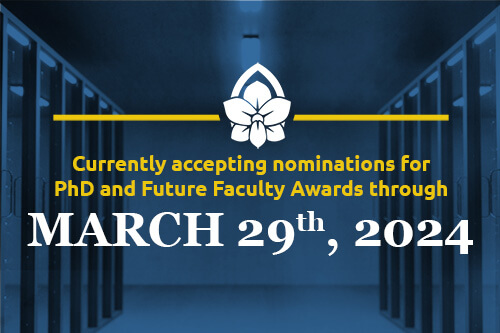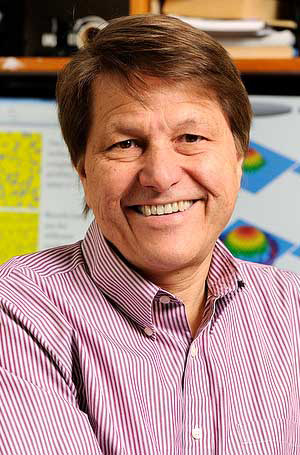
Mark O. Robbins Prize
in High Performance Computing
The Mark O. Robbins Prize is awarded annually to two PhD students who exemplify Dr. Robbins’ legacy, recognizing their outstanding achievement in high-performance computing. A third annual award, the Robbins Future Faculty Award, is targeted at post-doctoral students. Awardees are expected to be users of ARCH (Advanced Research Computing at Hopkins).

What I admired most about Mark was his keen eye for interesting problems, which he combined with deep intuition, to make beautiful insights about the physical world that many would have overlooked.
Robert Leheny, Ph.D.
Mark was the driving force behind bringing modern, high-performance computing to Johns Hopkins. The large computing systems he helped to create have changed the way we all do our research—he left indelible marks behind."
ALEX SZALAY, PH.D.
Who was Mark Robbins?
Mark Robbins was a renowned condensed matter and statistical physicist who played a key role in supporting the development of computational facilities at Johns Hopkins, through his leadership at the Maryland Advanced Research Computing Center (MARCC) and in the Institute for Data-Intensive Engineering and Science (IDIES).
He received his BA and MA degrees from Harvard University, was a Churchill Fellow at Cambridge University, U.K., and received his PhD from the University of California, Berkeley. Dr. Robbins was a professor in the Department of Physics and Astronomy at Johns Hopkins from 1986 until his untimely passing in 2020.
In addition to his love for physics, Dr Robbins was also an avid orchid enthusiast, cultivating and crossbreeding hundreds of plants in his basement and office in the Bloomberg Center. An active member of the Maryland Orchid Society, Dr. Robbins’ was renowned for his experimental crossbreeding techniques, earning him an Award of Merit from the American Orchid Society.
The Robbins Prize was instigated in 2020 to recognize outstandingly talented PhD students who reflect his contributions to computational science and engineering.
You can read more about Dr Robbins’ contributions to high-performance computing, Hopkins and the orchid community in the sources below.

Dr. Mark Robbins (pictured), a beloved professor in the Department of Physics and Astronomy at JHU from 1986–2020, was also an avid orchid enthusiast.
What will Winners Receive?
Two PhD awardees and one Future Faculty awardee will receive:
A commemorative plaque
Recognition in the high-performance computing (HPC) community via a presentation of their work at an ARCH (Advanced Research Computing at Hopkins)-sponsored conference in 2025
The Future faculty awardee will also receive a generous allocation of compute hours at MARCC and must acknowledge ARCH and the Robbins Prize in their ensuing pubs.
Who is Eligible?
PhD Prize
PhD Prize applicants must be:
• A JHU PhD student
• In their 3rd year or higher
• Nominated by their PhD advisor*
(limit of one nomination per advisor)
*Self-nominations will not be accepted
Future Faculty Prize
Future Faculty Prize applicants must be:
• A new or existing JHU post-doc
What is the Nomination Process?
The nomination application for both awards must be submitted as a single PDF file via email to arch-admin@lists.johnshopkins.edu by 5pm, Friday, March 29th 2024.
PhD and post-doctoral advisors are encouraged to nominate one PhD advisee and/or one post-doc student to be considered for this prestigious award. Advisors must provide a nomination letter for a student to be eligible; the student is responsible for submitting all other materials for prize consideration.
PHD Prize
A PhD Award nomination package shall consist of:
• An abstract of 300 words or less describing your research accomplishments related to computational science and engineering over the course of your PhD degree and specifically address the following questions:
What work in HPC have you completed?
Why do you deserve a prize in HPC?
• A copy of your CV (maximum of 2 pages in length)
• A 1-page letter of support from your PhD advisor describing your contributions to computational science and HPC development, e.g., through algorithm development, opening access to a new class of problems, solving a unique problem using computation, and including any contributions to the teaching mission in computationally related subjects or to DEI.
Future Faculty Prize
A FF nomination package shall consist of the same contents as the PhD nomination package (abstract, CV, and 1-page letter from your research advisor) with the distinction that the abstract shall address these topics instead:
Please explain your contributions to research, and potentially teaching, in HPC algorithms and/or applications.
Why do you need HPC to advance your work?
Since the Future Faculty award will contain an allocation of compute-hours from ARCH, the applicant’s abstract shall be devoted to providing a plan to use this allocation, i.e., FF applicants are encouraged to treat the application as if it were a project proposal.
Who has Received the Prize Previously?
2023 PhD Winners
Katharine Jenike, School of Medicine (Michael C. Schatz)
Jenike’s research focuses on developing computational methods in the emerging field of pan-genomics, a branch of genomics that aims to comprehensively characterize genetic variation among large groups, both within and between species.
Katiana Kontolati, Department of Civil and Systems Engineering (Michael D. Shields)
Kontolatis’s research focuses on scientific machine learning and high-dimensional uncertainty quantification (UQ) with a focus on surrogate modeling for partial differential equations (PDE) under uncertainty.
2023 Future Faculty Winner
Dr. Thomas Edwards, Department of Physics and Astronomy (Marc Kamionkowski)
Edwards’ research focuses on building new analysis tools that utilize modern statistical methods and high-performance computing to improve the performance and computational efficiency of gravitational wave data analysis.
2022 PhD Winners
Samantha Zarate, Department of Computer Science (Michael C. Schatz)
Zarate’s research focuses on utilizing high-performance computing with genomic structural variation and analysis.
Remy Yovanno, Department of Biophysics and Biophysical Chemistry (Albert Lau)
Yovanno’s research focuses on performing all-atom molecular dynamics simulations at scale using HPC.
2022 Future Faculty Winner
Dr. David Buchta, Department of Mechanical Engineering
Buchta‘s work in computational fluid dynamics simulations, along with his enthusiasm for mentoring young computational scientists, exemplify Dr. Robbins’ legacy making David a deserving recipient of this prestigious award.
2021 PhD Winners
Karthik Menon, Department of Mechanical Engineering (Rajat Mittal)
Menon‘s research focuses on the development of computational and data-driven techniques to study the interaction of fluids with flexible and moving surfaces within liquid flows.
Andrew Ruttinger, Department of Chemical and Biomolecular Engineering (Paulette Clancy)
Ruttinger‘s research focuses on using computational modeling to develop insights into quantum dot photovoltaics, lithium extraction from low-concentration sources, and the development of thermal energy storage.
2021 Future Faculty Winner
Sai Pooja Mahajan, Department of Chemical and Biomolecular Engineering (Jeffrey Gray)
Mahajan‘s work focuses on developing and applying computational techniques aimed at solving complex problems in computational lithography and computational protein structure, function, and design.
Acknowledgements
